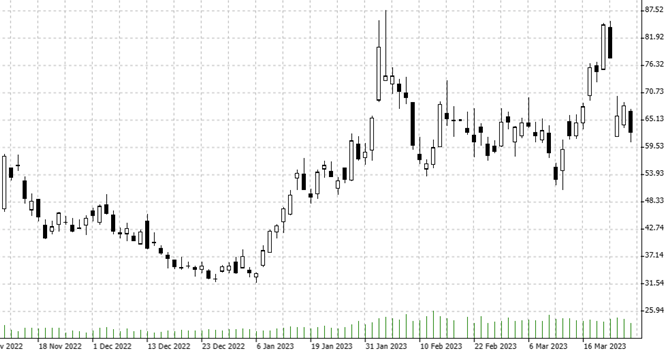

28.03.2023 – Bitcoin and co. had just recovered nicely, there are new setbacks. The US supervisory authority CFTC has sued the world’s largest crypto exchange Binance and its founder Changpeng Zhao. Previously, the SEC had already taken aim at Coinbase. The question is whether these are the last attacks.
It can happen that quickly: Cryptos had moulted as an escape currency in the current banking crisis. Just like the shares of banks considered to be healthy, which are now allowed to grab the remnants of the victims on the cheap. And like the shares of e-exchanges. But with the US regulator’s attack on Binance, the bullish phase is already gone. In addition to Ether and BTC, the prices of major cyber stocks also fell sharply, including Coinbase and Microstrategy, Marathon Digital, Hut 8 or Riot Platforms. Today, we take a look at Coinbase’s daily chart for a change.

Source: Bernstein Bank GmbH
It’s interesting that the share price started to pick up in January – presumably at that time savers fled wavering banks en masse to shift their money into e-currencies. Which promised new turnover and did not go unnoticed by attentive insiders. But last week, Coinbase’s stock took a dive after the Securities and Exchange Commission served the exchange with a so-called Wells Notice. That’s a warning that the Securities and Exchange Commission will investigate possible misconduct. The letter is named after John A. Wells, who served as Advisory Committee Chair of the SEC about half a century ago.
They are looking very closely
But back to the current case. The Commodity Futures and Trading Commission – which was fast asleep when the regional U.S. banks just flipped – is accusing the e-currency marketplace of violating U.S. financial market rules. For example, Binance founder Zhao allegedly instructed employees and customers to circumvent controls “in order to maximize corporate profits.” Among other things, the platform had not required its customers to provide information to verify their
identity, the CFTC said. It also said Binance had failed to implement “basic compliance procedures” against terrorist financing and money laundering.
Message to the industry
There is, of course, a system behind this. As mass murderer Mao Zetung used to say, punish one, educate hundreds. So the CTFC linked the move with a message to the entire industry. The action was a “warning to everyone in the world of digital stocks that the CFTC will not tolerate willful circumvention of U.S. law,” explained agency chief Rostin Behnam. His agency’s mission, he said, is to “find and stop misconduct in the volatile and risky digital securities market.” We wonder why the U.S. authorities are not taking decisive action against misconduct and incompetence at various regional banks, and why everyone is looking the other way when it comes to the Biden clan’s rather sleazy China dealings.
Our conclusion: Traders must be aware that politicians want to eliminate Bitcoin as a reserve currency. This is because cyber currencies cannot be controlled. Monetary policy with interest rate hikes or quantitative easing do not work here. Which means that economies can no longer be steered in one direction or the other. Moreover, it is simply dangerous for the banking industry if people can withdraw their money from accounts and park it on servers without any major problems. So presumably the attacks won’t stop – we had already warned months ago about the attack of politics on the unloved rivals. Then, if the banking crisis is still solved at some point, another reason to invest one’s money in Bitcoin, Ether or other e-alternatives will fall away as interest rates rise. We are curious to see what will happen next and will keep an eye on the situation for you!
______________________________________________________________________________________________________________
The content of this publication is for general information purposes only. In this context, it is neither an individual investment recommendation or advice nor an offer to purchase or sell securities or other financial products. The content in question and all the information contained therein do not in any way replace individual investor- or investment-oriented advice. No reliable forecast or indication for the future is possible with respect to any presentation or information on the present or past performance of the relevant underlying assets. All information and data presented in this publication are based on reliable sources. However, Bernstein Bank does not guarantee that the information and data contained in this publication is up-to-date, correct and complete. Securities traded on the financial markets are subject to price fluctuations. A contract for difference (CFD) is also a financial instrument with leverage effect. Against this backdrop, CFD trading involves a high risk up to the point of total loss and may not be suitable for all investors. Therefore, make sure that you have fully understood all the correlating risks. If necessary, ask for independent advice. CFDs are complex instruments and are associated with the high risk of losing money quickly because of the leverage effect. 68% of retail investor accounts lose money trading CFD with this provider. You should consider whether you understand how CFD work and whether you can afford to take the high risk of losing your money.7
